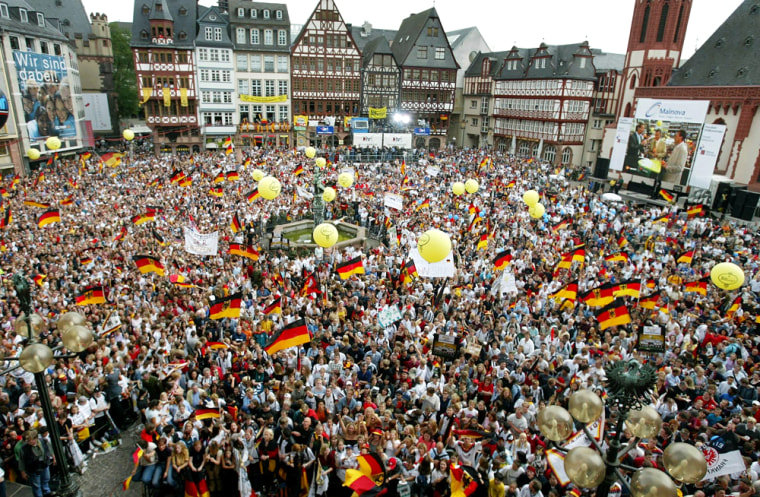Germany is hoping that the million soccer fans expected for the World Cup will give its torpid economy a mighty kick.
The country expects more than $12 billion in spending and 50,000 new jobs, and has put on a happy face with a friendliness campaign aimed at nudging sometimes-somber service workers to brighten up for the June 9-July 9 tournament in 12 cities.
But businesses, economists and politicians are hoping for even more — a boost to overall optimism to lift the gloom after four years of economic stagnation and hand-wringing, and a chance to show off Germany’s vaunted order and efficiency to potential investors.
But the task is huge and victory by no means guaranteed. After all, Germany’s unemployment is above 12 percent and economic growth stalled completely in the last quarter of 2005.
Worse, in the eyes of many, the country’s team is not cooperating. A humiliating 4-1 loss to Italy in a warmup match at the beginning of March raised fears of a World Cup flop that would leave the host country smiling through gritted teeth and take the air out of any boost in sentiment.
Economists are quick to declare that the event will have an immediate, measurable effect on the national economy. Some 50,000 jobs are expected to be created to help staff hotels, shops and venues hosting the games and those jobs, the government hopes, will remain permanently. The government has estimated that gross domestic product could increase by half a percent during the monthlong event.
Germany has history on its side.
Ahead of the 2002 World Cup, the economies of joint hosts Japan and South Korea were ailing, and they hoped the tournament would help spark a revival and increase their global stature.
South Korea has estimated the World Cup brought the nation about $4.1 billion in direct economic benefits in 2002 from increased investment in consumer spending, which accounted for about 0.74 percent of the country’s gross national product in 2001. Indirect economic benefits were estimated to total about $15.1 billion as the World Cup improved the image of South Korea and its companies, the government said.
Toshihiro Nagahama, an economist with Dai-Ichi Life Research Institute in Tokyo, said that the 2002 World Cup gave Japan’s economy a boost.
“Sales of digital electronic appliances such as TVs and DVDs went up, and constructing stadiums also was good for the economy,” he said. “Visitors from abroad went to the countryside in Japan and the occupancy rate in hotels went up.”
The government of German Chancellor Angela Merkel sees the championship as a way to promote Germany not only as a tourist destination, but as a business one as well.
Petra Hedorfer, chief executive of the German National Tourist Board, said the World Cup will boost the domestic economy by about $11 billion to $12 billion and that as many as 5.5 million hotel rooms will be needed to accommodate visitors.
Marco Bargel, chief economist for Germany’s PostBank, said that by the time the World Cup has come and gone, the amount of money spent renovating stadiums, expanding roads and parking and hiring workers would likely amount to about 0.5 percent of Germany’s gross domestic product.
He said that already some $3.6 billion to $4.8 billion had been spent by the government and organizers to ready the 12 cities for the event.
“And with the number of visitors expected, as well as the Germans who will travel to the cities to see the games, that is expected to bring in another 1 billion euros ($1.2 billion) or so,” Bargel said, adding that the average tourist is expected to spend about $965 to $1,200 while in Germany.
Even if Germany loses early in the tournament, the investment in improving roads, expanding rail tracks and renovating facilities will last.
The tournament is also a superb marketing platform for shoe companies Puma AG and Adidas-Salomon AG, for instance, and hotel prices are jumping on game nights.
Hermann Franzen, president of the HDE retailer’s association, said the World Cup, along with purchases ahead of a planned 2007 increase in value-added tax, would give weak retail sales a boost of 0.5 to 1 percent this year.
“Without the World Cup and the anticipation effect, it would have been just another weak year,” Franzen said.
And then there’s the effort to use the World Cup to promote investment in Germany. The government has launched a “Land of Ideas” television ad campaign stressing the country’s reputation for innovation and technology.
The term “Made in Germany” doesn’t carry the same cachet it once did, noted Stefan Chatrath, an economist at Berlin Free University. But if Germany can mount a successful World Cup and reap the benefits from the free publicity of an event that is expected draw hundreds of millions of viewers worldwide, it could generate some corporate interest.
“If you want to get companies to your countries, then there is an investment campaign you have to wage, along with the image campaign,” he said.
Germany’s infrastructure, efficient train and subway networks and a government trying to make it easier to hire and fire workers can help, but so is the need for fomenting development, new ideas and innovation.
That, Chatrath said, is still lacking, noting that the country ranked No. 15 in the World Economic Forum’s Global Competitiveness Report this year.
“I wish we were a land of ideas. All the major inventions they talk about in the campaign are from 50 or 60 years ago,” he said.
To help improve the stay of the more than a million visitors expected, the government last year began a National Service and Friendliness Campaign, rolled out by World Cup organizing committee head and retired soccer star Franz Beckenbauer.
It is aimed at helping Germans offer service with a smile rather than the stereotypical dourness.
“We Germans are friendly, we just have to let it show,” said Economy Minister Michael Glos.
